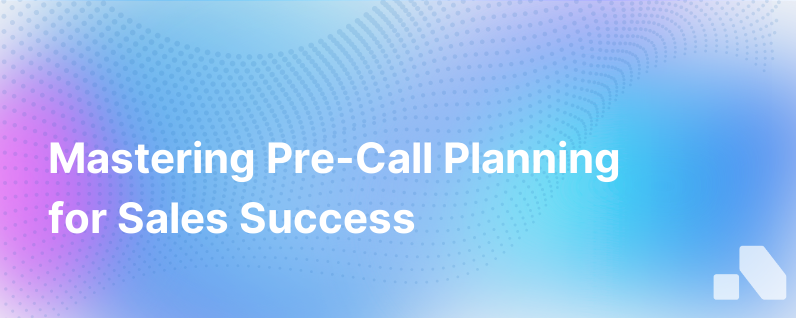Pre Call Planning
Published on October 8, 2023 by Sawyer Middeleer
A well-prepared sales rep is a successful sales rep. Every minute you invest in pre-call planning returns dividends in improved win rates, shorter sales cycles, and better customer relationships. But what qualifies as effective pre-call planning, and what does it entail?
This comprehensive guide to pre-call planning will provide you with everything you need to make every interaction meaningful and impactful for your prospective customers.
What Is Pre-call Planning?
To put it simply, pre-call planning refers to all the preparatory steps taken before a sales call to guide the conversation in a productive and strategic manner. It involves thorough research, identifying objectives, anticipating customer needs and questions, and creating a roadmap for the call. This process not only makes sales interactions more efficient, but also enhances the customer experience by designing conversations that are relevant, personalized, and value-adding.
The Importance of Pre-call Planning
Unfortunately, too many sales representatives neglect to do substantial pre-call planning, viewing it as a time-consuming hurdle. However, this couldn’t be further from the truth. Investing time in pre-call planning can drastically improve the likelihood of success in the following ways:
- Builds Credibility: Researching about your prospects equips you with knowledge about their priorities, challenges, and needs, which can help you tailor your solutions more effectively. Demonstrating an understanding of their context can significantly improve your credibility and rapport with them.
- Creates Efficiency: Pre-call planning helps ensure that conversations proceed smoothly and that no time is wasted. Instead of scrambling to find information during the call, you will be prepared to address specific questions or objections that arise.
- Improves Outcomes: Well-prepared sales reps are more likely to close deals faster and achieve higher customer satisfaction scores.
Core Elements of Pre-call Planning
An effective pre-call plan revolves around careful consideration of the following components:
Deep Dive Into Prospect Research: Leverage social media, company websites, press releases, and industry reports to gain a strong understanding of the prospect’s business, industry, challenges, and goals. Scrutinize recent news and events that might have impacted their operation and demands.
Define Your Goal: Every call should have a clear objective. Whether it's to book a demo, qualify a lead, or negotiate terms with a decision maker, our goals guide our actions, so be certain about your desired outcome from the interaction.
Identify Potential Roadblocks: Anticipate objections or questions that your prospect might have, and prepare concise, clear responses to them. Put yourself in their shoes, anticipate their doubts, and practice addressing them.
Develop Your Opening and Closing Statements: Know precisely how you will initiate and end the call. The start should be engaging and relevant, whereas the conclusion should encapsulate the value you offer, clearly communicate next steps and end on a positive note.
Prepare Your Value Proposition: Match the features and benefits of your product or service with the specific needs of your prospect. Aim to demonstrate how your offering can drive value for the prospect's business.
An Efficient Pre-call Planning Process
Following these steps can help streamline your pre-call planning process:
- Research: Use all available resources, from LinkedIn to company annual reports, to deepen your understanding of your prospect’s business.
- Outline the Call: Sketch a brief outline for your call, including opening and closing remarks, talking points, and questions.
- Set Your Objective(s): Define what you want to achieve with the call and formulate a strategy on how to get there.
- Anticipate Challenges: Identify possible objections or concerns prospect might have and prepare your responses well in advance.
- Role-play the Call: Practice scenarios with a colleague or manager if you are nervous or addressing complicated questions. Role-playing can provide constructive feedback, bolster your confidence, and prepare you for the unexpected.
- Review and Refine: After the call, take time to reflect on what went well and what could be improved. Use these insights to refine preparations for future calls.
Conclusion
Pre-call planning is a powerful tool that sets strong foundations for successful sales interactions. With due preparation, you can hold insightful conversations, establish credibility, and devise a personalized solution to your customers’ individual needs.
While pre-call planning might seem daunting due to the time investment, today's AI-powered tools are making this process simpler, more personalized, and efficient. With platforms like Aomni, which provides real-time account research and personalized sales content, pre-call planning no longer has to be tedious or time-consuming.